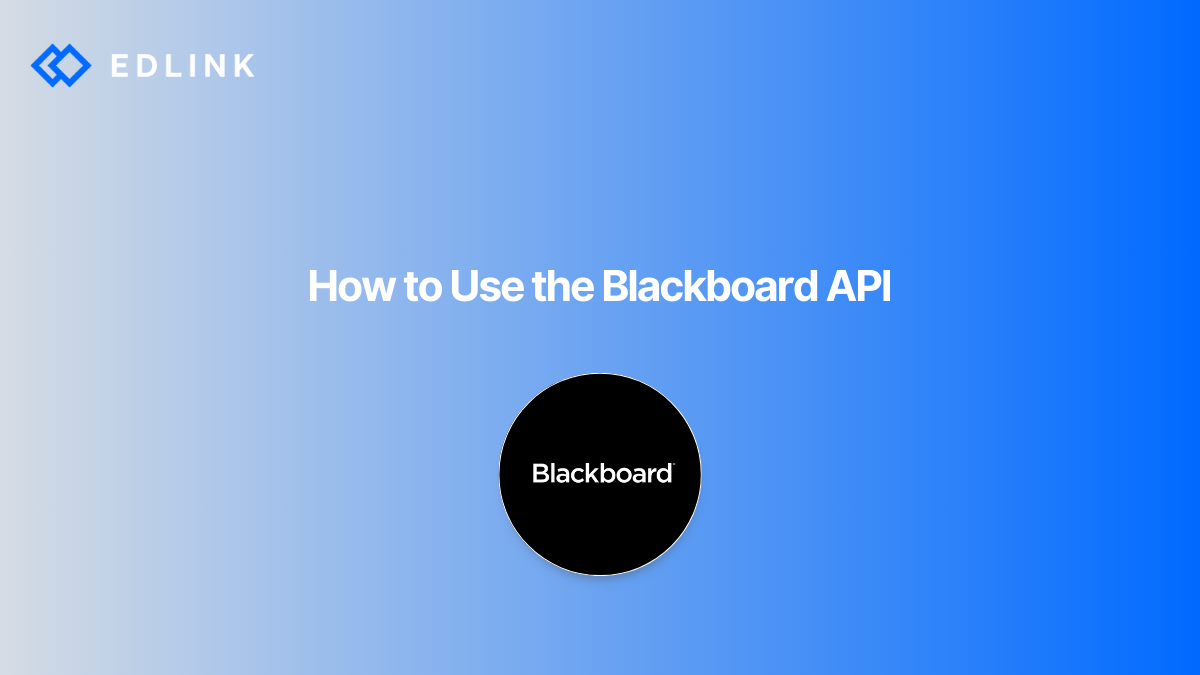About the Blackboard API
Apps can integrate with Blackboard through 2 methods:
- the Blackboard API
- the LTI® specification
In this article, we'll focus specifically on integration through the Blackboard API and discuss what apps can do with the API.
Overall the Blackboard API helps third-party developers implement integration features with a school’s Blackboard environment, such as:
- Single sign-on
- Content Integration
- Rostering
- Grade passback
Single Sign-On
Once a user runs through Blackboard’s authentication process, apps can create accounts for first-time users signing in or match users with their existing account.
Many apps match users based on their email addresses listed in Blackboard, there are several reasons why you should choose a different identifier. For security purposes, the authentication process will never expose the user's Blackboard password to the app.
Once a user is authenticated, the app can start to communicate with the user's Blackboard environment.
Content Integration
When a third-party app authenticates a user, the app can send back requests to the user’s Blackboard environment. So, a developer can generate resources that appear in the user’s Blackboard.
For example, a teacher logs into the app with their Blackboard credentials. The teacher assigns a lesson from the app. Then the app can act as the teacher, sends the necessary information to Blackboard to generate the lesson, and post it to the teacher's specified course.
The Blackboard API allows apps to read, create, or modify a variety of resources in the user's Blackboard environment, like:
- Attendance records
- Assessments
- Calendars
- Messages
- Courses
Click here for a full list of resources that can be accessed by the Blackboard API.
Rostering
The Blackboard API can be used to retrieve a list of users, their courses, and enrollments. These lists are helpful for developers who want to create accounts for users before the user logs in. In addition to rostering through the API, developers can gather lists of real-time enrollments (think about the changes for when a student leaves or joins a course during the school year).
Grade Passback
The API can also integrate to assign grades to students. The Blackboard API can sync grades between assignments in an app and the Blackboard gradebook. This feature reduces the time teachers spend gathering grades and adding to their gradebooks.
When developers rely on the API to sync grades, they won't have to spend time developing a gradebook or other methods to export grades.
Notes About the Blackboard API
Larger schools and universities may run different versions of Blackboard on their own in-house servers. Others may use a cloud service, like Blackboard Learn Ultra.
A third-party app that works for one district's Blackboard environment might work differently in another's. Why? Because of the size of these organizations that adopt Blackboard, IT admins push updates to their Blackboard environments take longer to implement. So, third-party app developers may find integrations with these Blackboard environments do not support all of the updated functions of the recent releases of Blackboard.
Like many LMSs, Blackboard uses OAuth 2.0 to authenticate users in it’s process. However, Blackboard's implementation of OAuth 2.0 is somewhat non-standard. While it still technically follows the OAuth 2.0 specification, Blackboard's implementation has quirks that aren't generally present in other implementations.
How to Get Started Using the Blackboard API
For integrations, Blackboard requires edtech developers who register for a Blackboard developer account. It is free to register for an account. But there may be costs associated with deploying the integration once the app reaches a certain scale. For example, developers must pay Blackboard to set up a development instance. This environment, which developers have to set up themselves, lasts for 3 months at a time.
Read More on Blackboard
Here are other articles we’ve written on Blackboard to help you on your journey:
- Challenges of Integrating with Blackboard
- API vs LTI Integration for Blackboard
- How to Implement Single Sign-On with Blackboard
- 5 Do-It-Yourself Tips for Building a Successful LMS Integration for EdTech Developers
- Common Pitfalls of LMS Integration
Learn More about Edlink
If you're looking for a partner who can help guide you through developing LMS integrations (like these), then let’s introduce ourselves. We’re Edlink!

